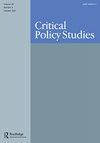Democracy in a time of misery: from spectacular tragedy to deliberative action
IF 2.4
3区 社会学
Q1 Social Sciences
引用次数: 18
Abstract
take the form of several other forms of ideational power, like frames and paradigms. Miller later lays out a distinction between narratives and stories, with little clear demarcation separating the two. This problem points to a larger issue within this approach: speaking past the mainstream of policy studies. While the philosophical gap between the Narrative Politics approach, which Miller bases in alethic relativism (123), and positivist approaches to policy studies is wide, engaging more with certain concepts rather than throwing them out with the bathwater could lead the two approaches to speak to one another more readily. For example, it is unclear how the concept of ‘cultural evolution’ is a significant improvement from related concepts like policy change or policy learning. Miller concludes the book with an examination of the value of the Narrative Politics approach and a discussion of the ultimate role of the scholar curator. The stated goals of the approach, to catalog competing truth claims and better understand the other, are laudable and important. Now, more than ever, we should be making concerted efforts to better understand the motivations and meanings behind narratives that we may find distasteful and make efforts to engage with those with whom we disagree. But should scholars not seek to do more than catalog competing narratives? Without a firm basis for making truth claims of our own, how can we speak back to the narratives of oppressive forces? Is the curator not ultimately as detached from their subject as the scientist is from hers? Ultimately, Narrative Politics in Public Policy is a thought-provoking and compelling addition to the literature on the politics of storytelling, and the evolution of cannabis policy in the United States. The Narrative Politics approach has the capacity to contribute to our knowledge of various other policy fields, and I hope that other scholars will take up the approach and develop it.苦难时期的民主:从壮观的悲剧到深思熟虑的行动
采取其他几种形式的概念力,如框架和范式。米勒后来对叙事和故事进行了区分,几乎没有明确的界限将两者区分开来。这个问题指向了这种方法中的一个更大的问题:超越政策研究的主流。虽然米勒以整体相对主义(123)为基础的叙事政治方法与政策研究的实证主义方法之间的哲学差距很大,但更多地参与某些概念,而不是把它们扔进洗澡水里,可能会使这两种方法更容易相互交流。例如,目前尚不清楚“文化进化”的概念是如何从政策变化或政策学习等相关概念中得到显著改进的。米勒在书的结尾考察了叙事政治方法的价值,并讨论了学者策展人的最终角色。该方法的既定目标,即对相互竞争的真相主张进行编目,并更好地理解对方,是值得称赞和重要的。现在,我们比以往任何时候都更应该共同努力,更好地理解我们可能感到厌恶的叙事背后的动机和含义,并努力与我们不同意的人接触。但是,学者们难道不应该寻求做更多的事情来编目相互竞争的叙述吗?如果没有我们自己提出真相主张的坚实基础,我们怎么能反驳压迫势力的说法?策展人最终是否不像科学家那样脱离他们的主题?最终,《公共政策中的叙事政治》是关于讲故事政治和美国大麻政策演变的文献的一个发人深省和引人注目的补充。叙事政治方法有能力为我们了解其他各个政策领域做出贡献,我希望其他学者也能采用这种方法并加以发展。
本文章由计算机程序翻译,如有差异,请以英文原文为准。
求助全文
约1分钟内获得全文
求助全文

 求助内容:
求助内容: 应助结果提醒方式:
应助结果提醒方式:


